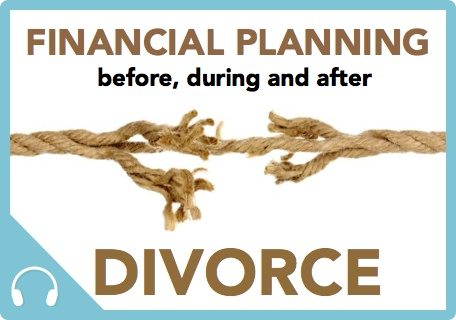
It's session number 30, and we’re going to be talking about Financial planning for divorce. With something like one in two marriages ending in divorce, there’s a lot of it about! And while there are many emotional and psychological implications when separating from your spouse or civil partner, there are obviously financial implications too.
Right, well, let’s get down to it. Divorce is a fact of life for many people. While I’m blessed that I haven’t been through it and I hope I never do, my big brother has, my best friend and business partner has – it’s happening all around. And yet, while we may be happy to talk about the likelihood of dying and the need for life insurance, or losing capacity and putting in place a Power of Attorney, we tend to shy away from planning for divorce.
I understand why of course: “Well, darling, let’s crack open a bottle of Merlot and talk about what’ll happen when I leave you.” That’s no way to begin a seduction.
Click to Listen
Podcast: Subscribe in iTunes | Play in new window | Download
But before we start talking about separation and acrimony, let’s talk about some love.
This week’s reviews
Two more 5* reviews this week – now up to 37 in total. The first is from MikeW1976:
“We don’t tend to discuss money or be into self-help in this country, so while there are several really useful American finance podcasts, there is a dearth in the UK. Pete’s podcast is therefore a really great tool for anyone looking to control and look after their money in the UK. He keeps it entertaining and interesting even if you aren’t a geek about money, like me!”
Thanks Mike – I’m glad you’re finding them useful. You’re right about the dearth of PF podcasts in the UK. If you search ‘personal finance’ in the UK iTunes store you get Which? Money, and then little me!!
The second review is from Biss5:
“Like many others, I found this through Rob and Rob from the Property Podcast, but after listening myself, I know why they constantly bang on about it! Great podcast, and I guess I’m amongst a very small minority that enjoyed the tax episode. Thanks Pete – keep up the great work”
Thanks Biss. I enjoyed the tax episode too, but then I enjoy them all! Interesting lesson learned last week after the Long Term Care episode. Obviously that subject related to a particular demographic, perhaps not very strongly represented in the listeners to this podcast as it wasn’t the most successful of release days, but no matter.
Thank you to all those who have left reviews, you can do so too at meaningfulmoney.tv/iTunes
 Sponsor Message
Sponsor Message
This podcast is brought to you with the help of Seven Investment Management, a firm of investment managers based in London. They put their name to my show and to my site and videos because they believe in what I’m doing, and I’m very grateful for their support. You can see what they’re up to at 7im.co.uk
Introduction
But like anything, careful planning for divorce can make an already difficult and traumatic experience that little bit less painful. Money is a huge source of relationship difficulties anyway. I have said before that the best way to prevent this is to form a financial team with your partner, discussing the family’s financial affairs regularly and constructively. Prevention is the best cure, always.
But if you’re thinking that there is likely to be a separation on the cards, you need to know the things you need to be thinking about as you head into it.
So I’m delighted to be joined today by my friend Paul Gorman, and very highly qualified financial planner from The Beaufort Group, based just outside Birmingham. Paul is a certified and chartered financial planner, and is a Resolution-accredited Divorce Financial Planner. There’s only about 40-50 of these in the UK so Paul knows his stuff, and I’m delighted that he’s been able to join me today through the miracle of the interwebs.
So let’s dive right into the interview:
INTERVIEW
Now, I didn't transcribe the whole interview, but here are the questions I asked:
What people need to know:
1) What are the main considerations when approaching divorce financial planning?
2) What is the process of reaching a financial settlement?
3) How does the court system work, particularly for contentious divorces
4) What about pre- and post-nuptial agreements? Do they work and what benefits can they offer?
Then moving onto what people can do:
5) Assuming a listener is heading towards a divorce, what steps can and should be taken in the early stages?
6) What information is likely to be required when reaching a financial settlement? How can people find out this information and have it to hand?
7) What steps can people take to make a painful situation as painless smooth as possible?
8) What should people do when the divorce is finalised to restart their lives apart?
Paul answered these questions superbly, as you would imagine. He talked about a Form E, which is a kind of financial statement which you would need to complete when getting divorced. It can be used as preparation too, to help you to get your head around what you have and what might be taken into account.
Summary
OK, I hope that was helpful. I wanted to round things off with a real-life example of how it is possible to get back on your feet after a divorce.
I met my client Ruth just over two years ago. She is my optometrist and sold me the glasses I’m wearing right now, not that you can see them! She was convinced that she was going to be destitute in retirement and wouldn’t even be able to run a car. As I learned more about her, it was clear that she models what it is to take control of your finances and to succeed in financial planning.
She fled from an abusive marriage in 1997 with basically the clothes on her back but little else. Previously a health visitor, she retrained late in life in Optometry so she had a good job but was early in her career. All she did, was begin to save out of her income every single month. She started small, but quickly increased the amount of savings. When I met her two years ago, she had amassed over a quarter of a million pounds in pensions and savings in 13 years, while at the same time paying off her mortgage in full. Bear in mind that there was a major financial crisis during that time, and you can see what an achievement that is.
I was able to show her that not only will she not be destitute, she will in fact be able to continue the same standard of living she currently enjoys. I even showed her she could retire two or three years earlier than she had hoped. She is so in the zone of saving, the even though she recently changed her job moving to a company that offered a pensions scheme, not only has she joined that scheme and is contributing the maximum to it, she has carried on with her personal pension at the same level. She is saving more than half her net salary every month, and pretty soon, she’ll be reaping the rewards.
So there is hope after divorce, but the same disciplines apply to any of us. If you’re not used to handling your own finances when you were with your partner, now is the time to get to grips with things. Hopefully this podcast will continue to be helpful to you
Outro
That's it for this session of the MM podcast, I hope it was helpful. If you have any questions or comments, please leave them in the comments section below.
If you like what you hear on this podcast, please leave a rating or review on iTunes by going to meaningfulmoney.tv/iTunes. This helps others to hear about the show and to subscribe, because it keeps me near the top of the rankings.
I hope you enjoyed this session. Next time we'll be talking about some other resources to help with the furthering of your financial education and development.
If you have any questions about this, go to meaningfulmoney.tv/feedback and leave a voicemail
Thanks for listening – I'll talk to you next time



Leave a Reply